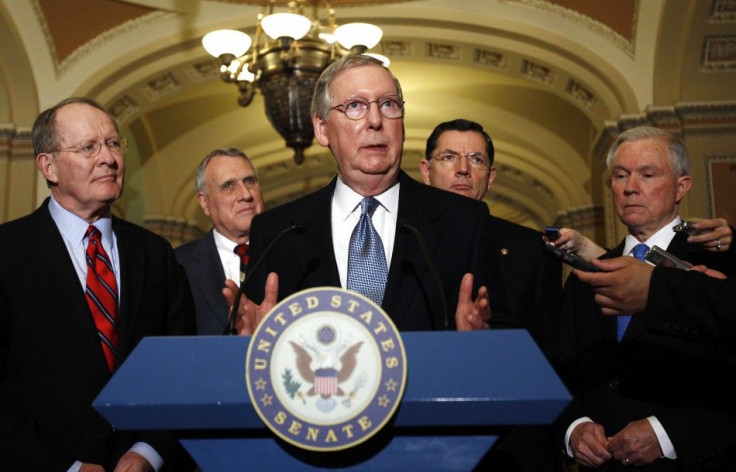McConnell Asks House to Pass Payroll Tax Bill While Deal Is Ironed Out

The ongoing Congressional standoff over a payroll tax cut deal has reached new heights of heated rhetoric, as major players in both parties and at all levels are beginning to chime in with various pleas for a deal.
Senate Minority Leader Mitch McConnell, R-Ky., finally broke his silence and suggested the House pass the extension of the tax cut, which has been languishing on Capitol Hill since the Senate approved it on Saturday, while Senate Democrats contribute to a conference committee aimed at ironing out a long term deal.
House Republicans sensibly want greater certainty about the duration of these provisions, while Senate Democrats want more time to negotiate the terms, he said. We can and should do both. Working Americans have suffered enough from the president's failed economic policies and shouldn't face the uncertainty of a New Year's Day tax hike.
The Republicans' Senate leader essentially points to an obvious middle ground by asking both parties to cede to the other's demands. McConnell was among the Senate Republicans who supported the current two-month extension of the tax cut, which also includes a stop-gap bridge on unemployment benefits and pushes back a decrease in Medicare payouts to doctors. All of three of the provisions are set to expire if Congress cannot reach a deal by Dec. 31.
House Majority leader John Boehner John Boehner, R-Ohio, doubled-down on his assertion that only a one-year extension will be passed.
Politics will be politics, he said. If you do the right thing for the right reasons, then the right things will happen. Everybody's already agreed that the best policy is a one-year extension.
Pressure Mounting on House GOP
Pressure has been mounting against House Republicans, as members of their own party, including Senators Scott Brown, R-Mass., John McCain, R-Ariz., and Olympia Snow, R-Maine, have all joined the chorus advocating passage of the Senate bill.
The added pressure comes after President Barack Obama called Boehner Wednesday to assert the Senate bill is the only offer available.
The Senate bill was ironed out by Reid and McConnell in an unusual weekend vote. It maintains the reduced rate of 4.2 percent on the payroll tax, extends unemployment benefits and pushes back planned reductions in reimbursements to doctors from Medicare.
The measure passed by an 89-10 vote on Saturday, and appeared cruising towards a floor vote in the House, with Boehner expressing support for the bill. Its prospects became dicey when reports stated the Tea Party faction of the Republican caucus vocally opposed the deal, claiming the Senate chose to kick the can down the road for two months.
House Republicans balked at the legislation, leading Boehner to demand further talks in the form of a conference committee that will iron out difference between the two houses. Senate members promptly left the Capitol and headed home after passing the bill on Saturday, and Reid has not expressed any interest in coming back to Washington D.C.
The bill was laced with GOP-friendly riders, including an expedited decision on the controversial Keystone XL pipeline, which the Obama administration had originally shelved. The project has been depicted as a job creator by GOP lawmakers, but faces heavy opposition from environmentalists. Still, the move was apparently not enough to entice Republican representatives.
Should the cut be allowed to expire, the tax will revert to its original 6.2 percent rate, hitting many middle income Americans in the paycheck at a time when many economists believe leaving money in their wallets can only help the economy.
According to reports, Republican lawmakers who initially doubted the bill's ability to help the economy are particularly opposed to its swiping of $120 billion from the Social Security Trust Fund. GOP representatives want the lost revenue to be covered by spending reductions, while Democrats have pushed tax increases on the wealthy.
The latest Republican intransigence may also be fueled by the prospect of having to vote against a tax cut during an election year. Many in the GOP have expressed doubt over the cut's ability to effectively fix the economy, whatever scant help it provides. Facing a potential vote on the unpopular cut in the throes of an election year would not bode well for naysayers.
--
© Copyright IBTimes 2024. All rights reserved.





















